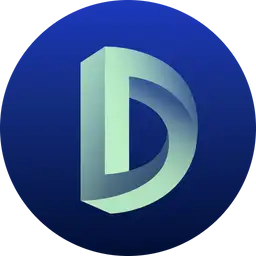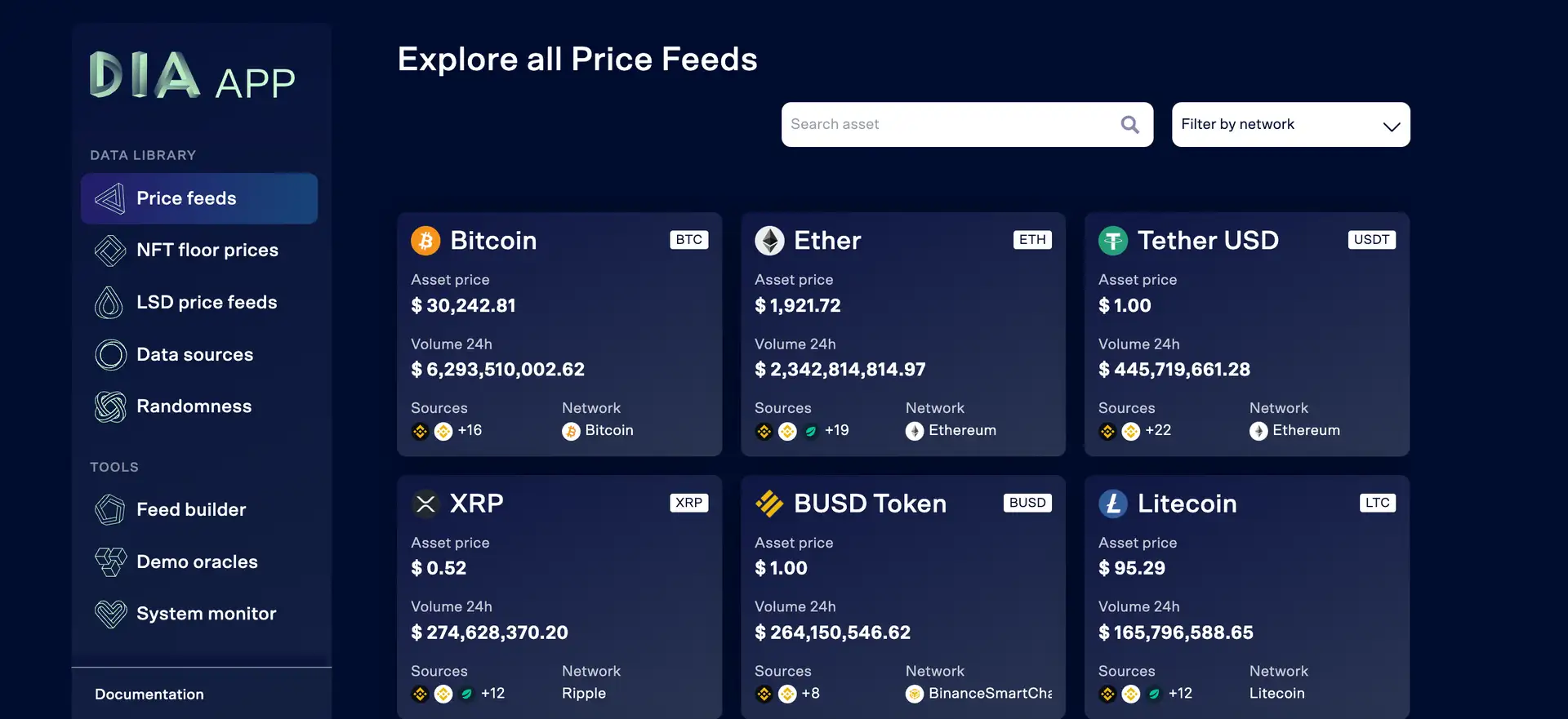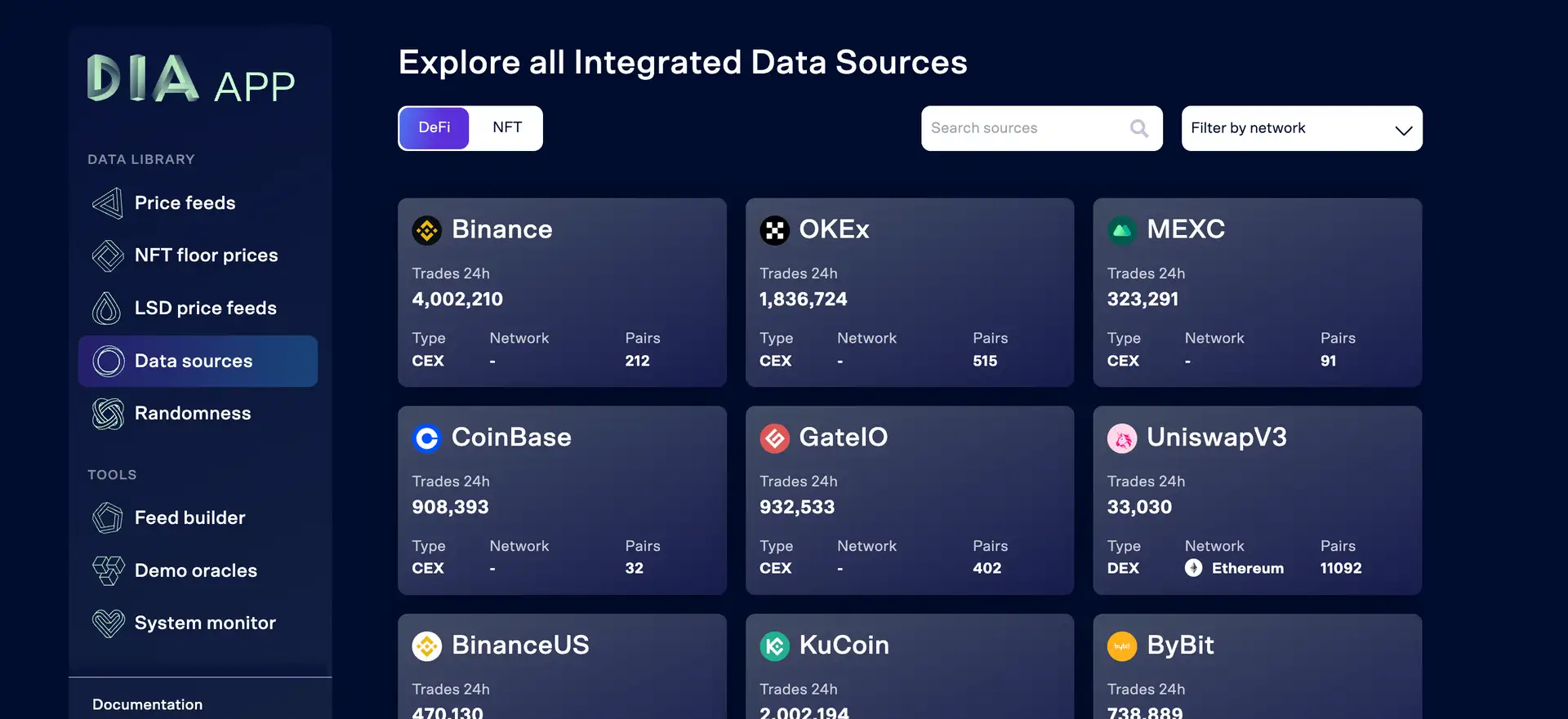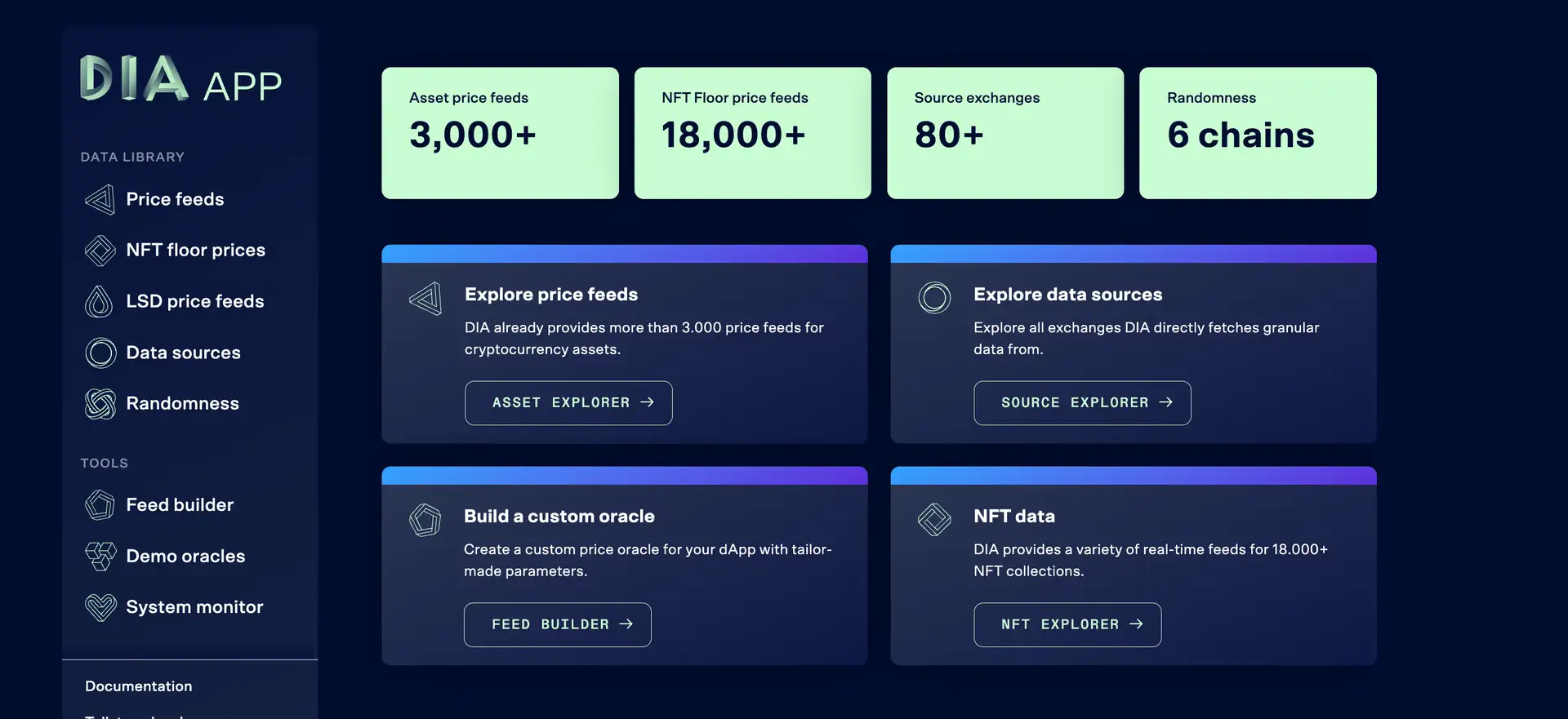About DIA App
DIA (Decentralized Information Asset) is a cross-chain oracle platform that focuses on aggregating and delivering data feeds for decentralized finance (DeFi), GameFi, and other Web3 applications. The mission of DIA is to provide a transparent, reliable, and flexible solution for decentralized data, enabling a wide range of applications across different blockchain networks. With the growing complexity of decentralized ecosystems, the need for accurate and real-time data is critical. DIA addresses this need by sourcing data from multiple channels, including on-chain and off-chain sources, and making it available through its customizable oracle solutions.
At its core, DIA aims to become a critical infrastructure layer for the Web3 ecosystem by offering oracles that are not only decentralized but also highly customizable and transparent. This approach allows developers and users to create and tailor data feeds according to their specific requirements, which is particularly valuable in a landscape where precision and accuracy are paramount. The platform’s commitment to transparency and community-driven governance further cements its position as a leading provider of decentralized oracles.
Founded with the goal of solving the issue of unreliable and opaque data in the blockchain ecosystem, DIA has evolved into a leading provider of decentralized data oracles. Over the years, DIA has expanded its capabilities to support over 50 blockchain networks, including Ethereum, Solana, and Polygon. These integrations highlight the platform's versatility and its ability to cater to the diverse needs of different blockchain ecosystems.
One of the major milestones in DIA's development was the launch of its custom oracle builders, which allow users to create tailored oracles that suit their specific needs. This feature distinguishes DIA from its competitors by providing a higher degree of flexibility and control over the data feeds. The platform’s commitment to transparency is further demonstrated through its open-source approach, where all data sources and methodologies are publicly accessible. This transparency is crucial in building trust with users, particularly in the context of DeFi, where the accuracy of data can have significant financial implications.
DIA's growth trajectory has been marked by strategic partnerships and integrations with major DeFi protocols. These partnerships have not only expanded the platform's reach but have also enhanced the quality and diversity of the data feeds available on the platform. Additionally, DIA has been proactive in expanding its network by integrating with new blockchain platforms, ensuring that its oracles are accessible to a broad range of users.
When comparing DIA to its competitors, such as Chainlink and Band Protocol, it is clear that DIA offers a unique value proposition. While Chainlink is known for its extensive network of data providers and Band Protocol for its focus on scalability, DIA differentiates itself through its community-driven approach and the customizability of its oracles. This allows users to tailor data feeds to their exact specifications, which can be a significant advantage in certain use cases.
Moreover, DIA's emphasis on transparency and decentralization aligns well with the broader ethos of the blockchain community. The platform’s open-source nature and community governance model ensure that it remains aligned with the interests of its users, which is crucial for long-term sustainability. Overall, DIA has established itself as a key player in the decentralized oracle space, with a growing ecosystem and a commitment to innovation and transparency.
- Cross-Chain Compatibility: DIA supports over 50 blockchain networks, making it one of the most versatile oracle platforms available. This ensures that developers can integrate DIA’s oracles across a wide range of decentralized applications.
- Customizable Oracles: Users have the ability to create fully customizable oracles, allowing them to tailor data feeds according to their specific requirements. This flexibility is particularly valuable for projects that require highly specialized data.
- Transparency: DIA operates on an open-source model, with all data sources and methodologies publicly accessible. This transparency builds trust and ensures that users can verify the accuracy and reliability of the data feeds.
- Community Governance: The platform is governed by its community, with DIA token holders having the power to influence key decisions. This decentralized governance model ensures that the platform evolves in a way that aligns with the interests of its users.
- Wide Integration: With integrations across major blockchain networks and partnerships with leading DeFi protocols, DIA’s oracles are widely accessible and trusted by a broad range of users.
- Staking Rewards: DIA token holders can participate in the platform’s staking mechanism, earning rewards for their contributions to the network’s security and data validation processes.
- Visit the official DIA website to explore the platform’s features and services. The homepage provides an overview of the available products, including data oracles, analytics, and governance features.
- For developers, head over to the developer documentation section. This resource is crucial for understanding how to integrate DIA’s oracles into your applications. It includes API references, setup guides, and examples.
- Create an account on the DIA platform by clicking the ‘Sign Up’ button on the website. This will allow you to access additional features such as custom oracle creation, data analytics tools, and staking options.
- If you are interested in contributing to the governance of the DIA platform, you will need to acquire DIA tokens. These can be purchased on various exchanges such as Binance, Coinbase, or Uniswap. Once you have tokens, you can stake them or participate in voting through the governance portal.
- For those looking to stake tokens, visit the staking section of the website. Here you can stake your DIA tokens to participate in data validation processes and earn rewards.
- To stay updated on the latest developments, join the DIA community on platforms like Twitter and Telegram. These channels provide regular updates, community discussions, and important announcements.
DIA App Token
DIA App Reviews by Real Users
DIA App FAQ
DIA ensures the reliability of its data oracles by utilizing a decentralized community of data validators who source, verify, and validate data from multiple on-chain and off-chain sources. This multi-layered approach minimizes the risk of manipulation and errors, providing highly accurate and transparent data feeds.
DIA offers fully customizable oracles, allowing developers to tailor data feeds to specific needs, including data sources, validation methods, and frequency of updates. This flexibility is particularly valuable for complex DeFi applications requiring specialized data that generic oracles cannot provide.
Yes, anyone can participate in DIA’s data validation process by staking DIA tokens. Validators are rewarded for their contributions in ensuring data accuracy. To get started, purchase DIA tokens on an exchange like Binance and follow the staking instructions on the DIA website.
DIA’s community governance model allows token holders to propose and vote on key decisions, ensuring that the platform evolves according to the collective vision of its users. This decentralized approach empowers the community to shape the future of DIA and align the platform’s development with its users’ needs.
While decentralized oracles like DIA offer significant advantages in transparency and security, they are not immune to data manipulation or technical failures. However, DIA mitigates these risks through a rigorous validation process, open-source transparency, and ongoing community audits, ensuring the highest data integrity standards.
You Might Also Like












